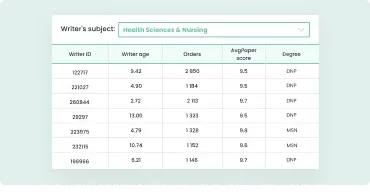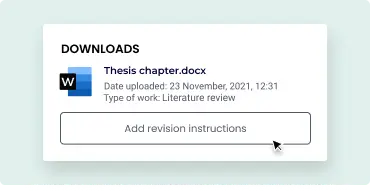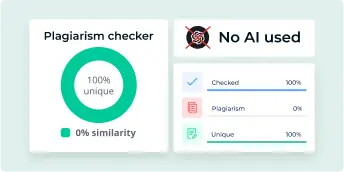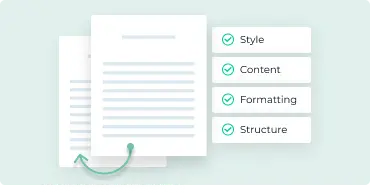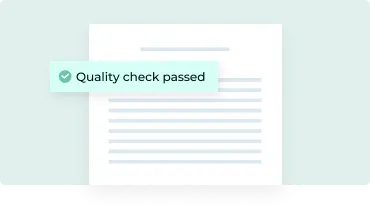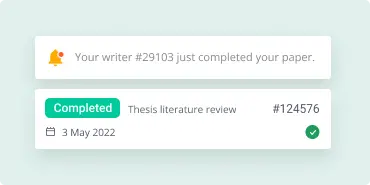Get a Professionally Written Rhetorical Analysis Thesis Statement
A team of competent writers is ready to craft an impactful rhetorical analysis thesis based on your prompt
Guarantees for writing an impeccable thesis statement
Streamline your rhetorical analysis thesis statement with our service
Our writing services are completely secure; we’ve taken the most cutting-edge precautions to ensure that you are never compromised when composing a rhetorical thesis statement with us.
-
 Your intellectual property is protected.
Your intellectual property is protected.We never resell or use already-written works from our databases: your thesis statements belong exclusively to you.

-
 Privacy protection
Privacy protectionOur professional academic service is completely confidential due to our privacy policy, CCPA & GDPR acts, and SSL encryption.

-
 Secure payments
Secure paymentsYou can pay for thesis statements for rhetorical analysis with all popular credit/debit cards. We use Solid and Ecommpay gateways, so your data is safe.

Your personal thesis statement writer has it all under control
Customer’s reviews on our rhetorical thesis statement writing
Thesis Statement Rhetorical Analysis Explained
Rhetorical analysis is not an easy task, as it requires a close reading of the assigned piece and its detailed dissection into techniques and methods used by the author to achieve their purpose. Therefore, a student new to rhetorical analysis as a distinct method of writing and public presentation may find it hard to identify all these elements or misinterpret the author’s message.
However, we at ThesisWritingService believe that this task shouldn’t be that challenging to students. The foundation of smooth and easy work on this assignment is a strong thesis statement, which may guide you throughout the process and help you present an in-depth analytical discussion.
How to Write a Thesis for a Rhetorical Analysis?
When it comes to writing a thesis statement, rhetorical analysis is no different from other types of academic assignments in terms of its place and purpose. Traditionally, the thesis statement should be placed at the end of the introductory section to outline the content of the next sections.
Many students have doubts about how to write a thesis for a rhetorical analysis. If this is about you, here are some handy tips to get you started:
- Keep it short and clear. Ideally, your thesis statement should be between 5 and 15 words, focusing only on the main aspects of the analyzed piece. However, you can sometimes make it a bit longer to cover all the elements needed from the formula presented below.
- Name the oratorical strategies. You should outline the language means you’ve identified in the analysis process early at the start of your paper. This list will give your readers a roadmap to your content, and they will be able to identify various parts of your analytical discussion without hardship.
- Study the text closely. Before making a list of oratorical techniques, you need to examine the assigned text very closely to find concrete examples and categorize them. The easiest techniques you can quickly spot include juxtaposition, allusion, comparison, emotional statistics, facts, etc.
- Focus on the purpose. After you have read the piece a couple of times, you may form a complete opinion about it. Compare the content to the title; is there any contradiction? What is the author’s real purpose and message? Once you identify them, structure your analysis around the main purpose to avoid going off-topic.
- Analyze the anticipated effects. As soon as you cover the techniques the author has employed to produce a specific effect on the audience, it’s time to proceed to the discussion of those effects in more detail. What is the expected action on the part of the audience? Is the effect strong, or has the author failed to achieve their oratorial outcomes?
If you want a tried and tested template to complete this activity, use the following rhetorical analysis thesis formula for your statement:
- An adjective that characterizes the analyzed piece.
- The author’s name.
- The enumeration of rhetorical techniques.
- The audience.
- The statement of the author’s purpose.
Let’s see how it works in practice. If we formulate a thesis statement for the essay about Jessica Grose’s article “Cleaning: The Final Feminist Frontier,” it should ideally look as follows:
In her emotionally charged article, Jessica Grose uses appeals to ethos, logos, and pathos to convince female audiences that home cleaning is no longer an exclusively female chore.
The Basics of Writing a Thesis for Rhetorical Analysis
The production of high-quality rhetorical analysis thesis statements depends on how well you understand this type of content. Here is a quick introduction to the writing style, the elements to cover in the statement, and the analytical components you should examine in the home task.
The Main 5 Elements of Rhetorical Analysis
If you’re unsure about how to write analysis of evidence for your paper, follow this breakdown of the elements it should necessarily include to look complete and authoritative:
- Purpose. The starting point of any assignment of this type that you should cover in the thesis statement is the author’s purpose. Is it a political speech aimed at mobilizing the nation in a protest against tyranny? Is it an emotional feminist article calling for more equality?
- Audience. Next, you should identify the audiences to which the analyzed work is directed in your statement. Feminist speeches and articles mainly target women, political speeches and publications are aimed at a specific politically affiliated group, etc.
- Context. What is the historical and socio-political context of the article’s or speech’s production and delivery? By understing the key aspects of the context, you may build a much more informed analytical discussion.
- Topic. The main subject of the assigned reading is also significant for shaping the thesis statement, as it helps you build the analysis around the main theme and determine whether the author has covered it sufficiently.
- Writer. Dig a bit deeper into the author’s persona and credentials. Who is the speaker? What professional expertise do they have in the discussed subject? What first-hand experiences can they share?
Three Compositional Parts of Your Rhetorical Analysis
To be able to create a great paper, you need to master the rhetorical triangle and be able to identify its elements’ presence in the text:
- Logos — context. This aspect is responsible for the author’s logic and reasoning, which they use to convince the audience of their opinions. By setting the right context for their arguments, the speakers or writers can make a stronger point and attain their objectives.
- Pathos — audience. This is the emotional element of the assigned piece, which uses emotionally charged or involving arguments, facts, figures, and language to engage the audience.
- Ethos — writer. This part is responsible for the author’s credibility and authority, which they can build using facts, credible sources, and statistics from authoritative agencies.
Get a Stellar Thesis Statement for Rhetorical Analysis from our Writers
If you’re still unsure about how to compose a good rhetorical analysis thesis, welcome to our company. Here, you can hire a writer from professional thesis services and enjoy the help of seasoned pros at every step of rhetorical assignment or thesis statement writing. We’re online 24/7, ready to help struggling students and make complicated things simpler for you.


